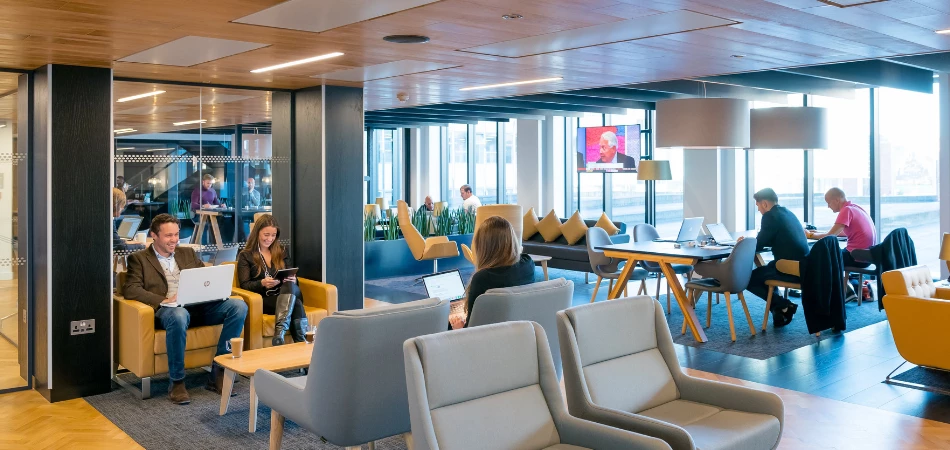
Partner Article
World’s largest companies to shift focus towards flexible workspace
-
69% of global corporates plan to increase utilisation of co-working and flexible workspace over the next three years
-
44% believe flexible workspace will comprise up to a fifth of all corporate workspace
-
75% aiming to boost employee happiness and productivity through utilisation of business space
The demand for flexible workspace is set to accelerate as over two thirds of global corporates plan to increase their use of flexible co-working and collaborative space over the next three years, according to new research from leading global property consultancy Knight Frank.
Knight Frank’s (Y)OUR SPACE report, published this week, surveys senior executives at 120 global companies which collectively employ in excess of 3.5 million people worldwide and occupy an estimated 233 million sq ft of office space, equivalent to the total amount of office space in Central London.
Knight Frank has Yorkshire offices in Leeds, Sheffield and Harrogate.
The research shows global corporates intend to operate increasingly from flexible, serviced and co-working spaces, which create a more collaborative working environment and offer the freedom to expand and contract quickly according to market conditions.
Today, despite the proliferation of co-working and serviced office operators, the majority of global corporates occupy office space on a traditional lease model. Two thirds of companies surveyed by Knight Frank reported that co-working, serviced and flexible office space comprise 5% or less of their current office space. A small minority, less than 7%, said that flexible workspace exceeds a fifth of their total workspace.
However, Knight Frank’s research reveals that the proportion of flexible space within companies’ portfolios is set to increase dramatically. Over two thirds, 69%, of global corporates plan to increase their utilisation of co-working spaces, and 80% expect to grow the amount of collaborative space they use over the next three years.
Furthermore, almost half, 44%, stated that flexible space will constitute up to a fifth of all office space in the next three years. An additional 16% estimated that as much as half of their workspace globally would be flexible space within the same time period. Over half of companies (55%) identified increased flexibility as the main driver of this change, with a significant proportion (11%) stating that the sense of community fostered among workers was the key benefit. A further 11% stated that the greater speed to becoming operational was the primary reason for selecting co-working or serviced office space ahead of more conventional office space.
The overwhelming majority of respondents, 75%, stated that personal productivity linked to wellbeing and happiness, would increase as they shift towards a new flexible and collaborative model of occupancy that is more in keeping with today’s business structures and working styles.
Eamon Fox, partner and head of office agency for Knight Frank in Leeds, said: “This research underlines that a decade of global economic uncertainty has reshaped how many of the world’s largest companies view workspace.
“Shorter business planning horizons, together with the emergence of new, more agile corporate structures has driven demand for flexible space which enables companies to react to change quickly.
“While co-working and serviced office operators have grown rapidly over the past five years, driven largely by start-ups and the freelance economy, this is only the tip of the iceberg with latent demand from global companies set to emerge over the next three years.”
“The demand for flexibility is the single biggest threat - and opportunity - to owners of office space. The recent boom in co-working is indicative of a structural change within commercial real estate whereby companies desire space that is flexible, highly serviced and aligned within the realities of doing business in an age of disruption. Some co-working operators have capitalised on this already, but it is imperative that owners and developers react to the new reality where customer is king.”
This was posted in Bdaily's Members' News section by Robert Beaumont .
Enjoy the read? Get Bdaily delivered.
Sign up to receive our popular Yorkshire & The Humber morning email for free.








 Raising the bar to boost North East growth
Raising the bar to boost North East growth
 Navigating the messy middle of business growth
Navigating the messy middle of business growth
 We must make it easier to hire young people
We must make it easier to hire young people
 Why community-based care is key to NHS' future
Why community-based care is key to NHS' future
 Culture, confidence and creativity in the North East
Culture, confidence and creativity in the North East
 Putting in the groundwork to boost skills
Putting in the groundwork to boost skills
 £100,000 milestone drives forward STEM work
£100,000 milestone drives forward STEM work
 Restoring confidence for the economic road ahead
Restoring confidence for the economic road ahead
 Ready to scale? Buy-and-build offers opportunity
Ready to scale? Buy-and-build offers opportunity
 When will our regional economy grow?
When will our regional economy grow?
 Creating a thriving North East construction sector
Creating a thriving North East construction sector
 Why investors are still backing the North East
Why investors are still backing the North East